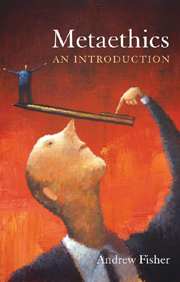Book contents
- Frontmatter
- Contents
- Preface
- Introduction
- 1 The open question argument
- 2 Emotivism
- 3 Error theory
- 4 Moral realism and naturalism
- 5 Moral realism and non-naturalism
- 6 Quasi-realism
- 7 Moral relativism
- 8 Moral psychology
- 9 Moral epistemology
- 10 Fictionalism and non-descriptive cognitivism
- Questions
- Glossary
- References
- Index
1 - The open question argument
- Frontmatter
- Contents
- Preface
- Introduction
- 1 The open question argument
- 2 Emotivism
- 3 Error theory
- 4 Moral realism and naturalism
- 5 Moral realism and non-naturalism
- 6 Quasi-realism
- 7 Moral relativism
- 8 Moral psychology
- 9 Moral epistemology
- 10 Fictionalism and non-descriptive cognitivism
- Questions
- Glossary
- References
- Index
Summary
The future historian of “thought and expression” in the twentieth century will no doubt record with some amusement the ingenious trick, which … is the naturalistic fallacy.
(Frankena 1939: 464)Why, then, isn't Moore's argument a mere period piece? How ever readily we now reject as antiquated his views in semantics and epistemology, it seems impossible to deny that Moore was on to something.
(Darwall et al. 1992: 116)CHAPTER AIMS
To introduce the open question argument (OQA) and how it relates to the naturalistic fallacy.
To explain a number of problems with the OQA.
To show how the OQA has shaped the metaethical landscape.
Introduction
Some things seem to resist definition. How might we define “person”, “politics”, “feminism”, “beauty”, “music”, “yellow” or “society”? Being told that a person is just H15750N310O6500C2250Ca63P48K15S15Na10Cl6Mg3Fe1 or that music is just some combination of sound frequencies, leaves us unconvinced. Writing about how to define “yellow”, G. E. Moore says:
We may try to define it by describing its physical equivalent; we may state what kind of light-vibrations must stimulate the normal eye, in order that we may perceive it. But a moment's reflection is sufficient to [show] that those light-vibrations are not themselves what we mean by yellow.
(Moore [1903] 1993: 62, emphasis added)The question at the heart of this chapter is whether we think that “good” also resists definition.
- Type
- Chapter
- Information
- MetaethicsAn Introduction, pp. 11 - 24Publisher: Acumen PublishingPrint publication year: 2011



